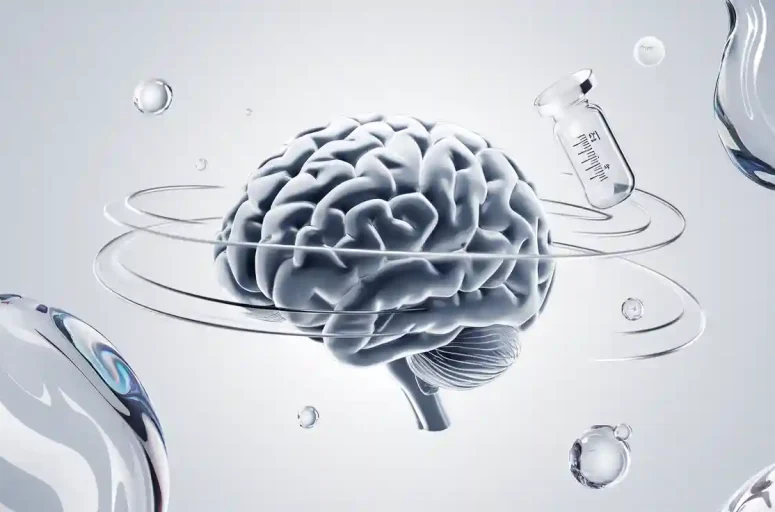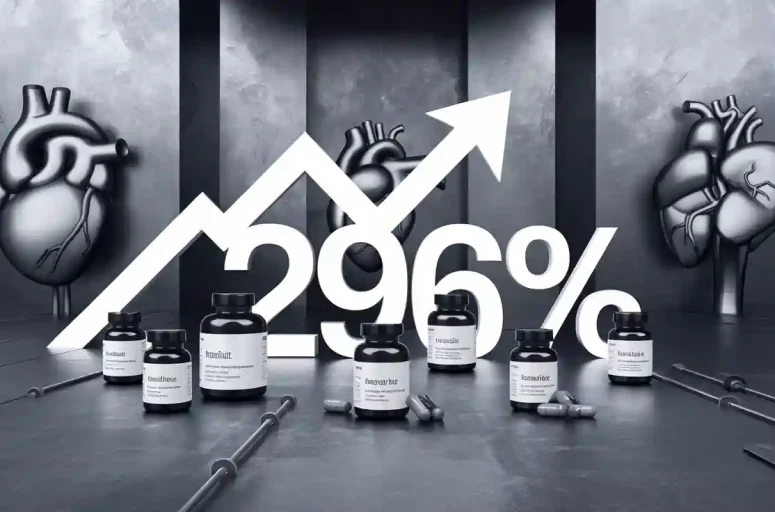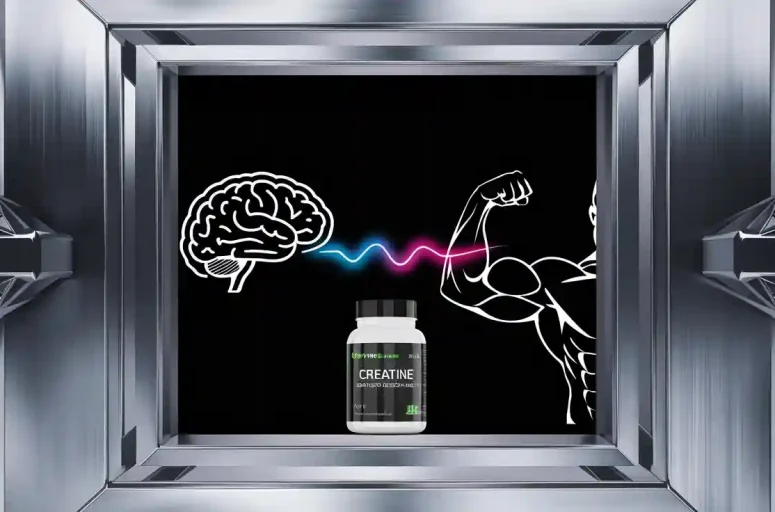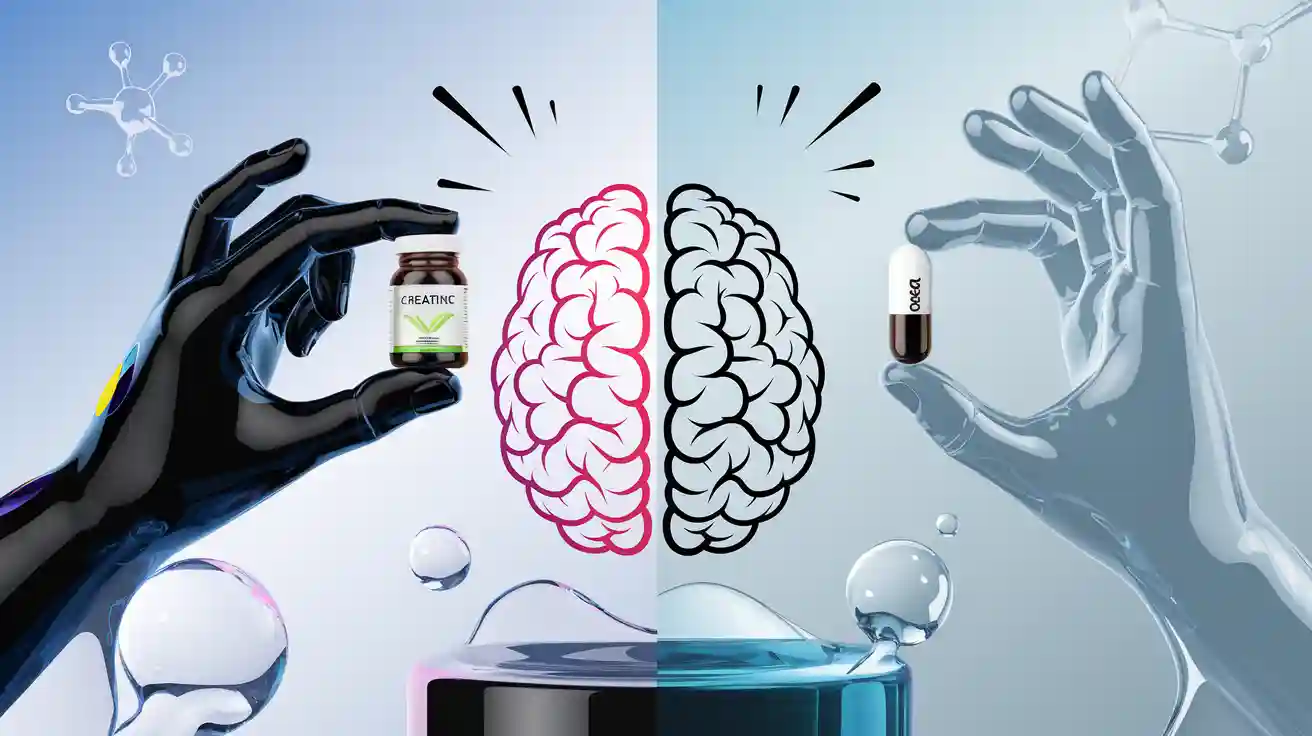
You might wonder if creatine or nootropics work better for a healthy brain. Recent research shows creatine can boost cognition, especially memory and processing speed, when your brain faces tough tasks. Studies highlight how creatine helps with complex memory activities and may sharpen how fast your brain works. However, nootropics show mixed results, and scientists agree that results vary from person to person. When you compare creatine vs nootropics brain health, current evidence points to creatine as a promising option for supporting your brain.
Key Takeaways
Creatine boosts brain energy and improves memory, especially during challenging tasks.
Nootropics can enhance focus and cognitive performance, but their effects vary by individual.
Creatine is safe for most people and shows consistent benefits for cognitive function.
Nootropics may cause side effects like headaches or mood changes; monitor your response.
Older adults and those facing cognitive decline may benefit most from creatine supplementation.
Younger adults seeking sharper focus and memory may find nootropics more effective.
Combining creatine and nootropics can support both energy and cognitive function, but start with low doses.
Always consult a healthcare professional before starting any new supplements for brain health.
Creatine Overview
What is Creatine
You may know creatine as a popular supplement for athletes, but it plays a key role in your body’s energy system. Creatine is a natural compound found in your muscles and brain. Your body makes creatine from amino acids, and you also get it from foods like meat and fish. When you use creatine supplementation, you help your body store more energy for demanding tasks. This energy supports both physical and mental performance.
Brain Function
Your brain needs a lot of energy to work well. Creatine helps your brain maintain high levels of ATP, which is the main energy source for cells. When you face stress or tough mental challenges, creatine supplementation can boost your brain’s ability to keep up with these demands. Studies show that higher creatine levels in the brain support better function, especially during activities that require quick thinking or memory. If your brain does not get enough creatine, you may notice problems with development and function. Research suggests that creatine supplementation increases brain creatine content, which helps maintain ATP levels. However, scientists still study how much creatine supplementation affects ATP in different people and situations.
Tip: Your brain uses more energy than any other organ in your body. Keeping creatine levels high may help you stay sharp during exams or long workdays.
Forms and Use
When you look for creatine supplements, you will find several types. Each form has unique features, but not all work the same way. Here are the main forms you might see:
Creatine monohydrate: The most common and well-researched type. It increases muscle mass and strength and supports brain function.
Creatine ethyl ester: Marketed for better absorption, but studies do not show clear benefits.
Creatine hydrochloride: Dissolves easily in water, but does not show stronger effects for muscle or brain function.
Magnesium creatine chelate: Suggested to help with athletic performance, but research is limited.
Buffered creatine monohydrate: Claims to reduce side effects, but evidence does not support this.
Liquid creatine: Available as a drink, usually in the form of creatine monohydrate.
You can use creatine supplementation in powder, capsule, or liquid form. Most people choose creatine monohydrate because it has the most scientific support for both muscle and brain function. If you decide to try creatine supplementation, start with a small dose and see how your body responds.
Medical Disclaimer: This information is for educational purposes only. You should not consider it medical advice. Always talk to a healthcare professional before starting any supplementation or making health-related decisions.
Nootropics Overview
What are Nootropics
You may hear the term nootropics when people talk about supplements for a healthy brain. Nootropics are substances that help you improve learning, memory, and focus. Many people call them cognitive enhancers because they support mental performance. You can find nootropics in natural forms like herbs or nutrients, and in synthetic forms made in labs. Some popular examples include Brahmi, Ginkgo biloba, and Piracetam.
Note: Nootropics do not work the same for everyone. You may notice different effects depending on your age, health, and lifestyle.
Types
Natural
Natural nootropics come from plants, herbs, and nutrients. You may see these in health food stores or as dietary supplements. Some well-known natural nootropics include:
Brahmi
Ginkgo biloba
Centella asiatica
Bacopa monnieri
Acetyl-L-carnitine (ALCAR)
These options often appeal to people who want a healthy approach to supporting their brain.
Synthetic
Synthetic nootropics are made in laboratories. You may need a prescription for some of these, while others are available as supplements. Common synthetic nootropics include:
Piracetam
Modafinil
Racetam
Armodafinil
Atomoxetine
Synthetic options may offer stronger effects, but you should use them with care and under medical supervision.
Type | Examples |
|---|---|
Natural | Brahmi, Ginkgo biloba, Centella asiatica |
Synthetic | Piracetam, Modafinil, Racetam |
Brain Health Role
Nootropics support a healthy brain in several ways. You may notice better focus, sharper memory, and improved mental energy. Scientists have found that nootropics work through different mechanisms:
Mechanism | Description |
|---|---|
Neurotransmitter modulation | Some nootropics boost chemicals that help your brain send signals faster. |
Blood flow enhancement | Certain agents improve blood flow and oxygen to your brain. |
Oxidative stress reduction | Some compounds lower inflammation and protect your brain from damage. |
Neuroplasticity promotion | Nootropics help your brain grow new connections and recover from stress. |
You see nootropics marketed everywhere as cognitive enhancers. The global market for these supplements keeps growing. In 2024, the market reached $2.3 billion. Experts expect it to grow at a rate of over 7.8% each year from 2025 to 2034. By 2034, the market could be worth more than $14.5 billion. This shows that many people want products that promise a healthy brain and better mental performance.
Tip: Always read labels and research products before you try new nootropics. You should talk to a healthcare professional if you have questions about safety or effectiveness.
Medical Disclaimer: This information is for educational purposes only. You should not consider it medical advice. Always consult a healthcare professional before making health-related decisions or starting new supplements.
Creatine as a Nootropic
Mechanism
You may wonder how creatine works in your brain. Creatine supports brain energy by helping cells produce ATP, which powers every brain function. When you use creatine supplementation, you increase phosphocreatine stores, giving your brain more fuel for demanding cognitive tasks. This boost helps you handle executive function challenges and maintain mental performance during stress.
Studies show that creatine influences neurotransmitter regulation in several ways:
Creatine affects cognitive processing and protects neurons.
It raises levels of brain-derived neurotrophic factor (BDNF), which keeps your brain cells healthy.
Creatine interacts with neurotransmitter systems, supporting mood and cognitive function.
Mechanism | Description |
|---|---|
BDNF Release | Creatine supplementation increases phosphocreatine and ATP, which stimulates BDNF release. |
PGC-1α Upregulation | Creatine boosts PGC-1α, leading to more mitochondrial growth and higher BDNF in the brain. |
Calcium Signaling | Creatine affects calcium signaling and mTOR pathways, helping release neurotrophic factors. |
Cytokine Release | Creatine supplementation during exercise improves serotonin and dopamine, supporting mood. |
You also see creatine acting as a neuromodulator. It interacts with NMDA, GABAA, and serotonin 1A receptors, which are important for neurotransmission. Studies suggest creatine supplementation can reduce neuronal cell loss, showing its protective effects on cognitive function.
Tip: Keeping your brain’s energy system strong may help you stay focused and improve executive function during tough cognitive tasks.
Cognitive Effects
You may notice several effects of creatine on your cognitive function. Studies show that creatine supplementation improves memory, attention, and processing speed. When you face challenging cognitive tasks, your brain uses more energy. Creatine helps you maintain performance and reduces mental fatigue.
Researchers found that creatine supplementation supports executive function and boosts cognitive performance. You may experience faster reaction times and better memory recall. Studies highlight that creatine monohydrate is especially effective for these benefits.
Outcome | SMD | 95% CI | Hedges’s g |
|---|---|---|---|
Memory | 0.31 | 0.18 – 0.44 | 0.3003 |
Attention Time | -0.31 | -0.58 to -0.03 | -0.3004 |
Processing Speed Time | -0.51 | -1.01 to -0.01 | -0.4916 |
You see the effects of creatine most clearly when you perform executive function tasks that require quick thinking. Studies show that creatine supplementation helps you stay sharp and reduces the time needed for cognitive tasks.
Research Findings
You may read about creatine as a popular supplement for cognitive enhancement. Studies show that creatine supplementation improves cognitive performance, but the evidence is still growing. Researchers found that medium-dose creatine hydrochloride improved reaction time and increased frontal brain creatine levels. Studies also suggest creatine supplementation may help reduce mood swings and support overall brain health.
Some studies report that creatine supplementation not only boosts cognitive function but also improves serum lipid profiles, showing broader health benefits. You should know that while creatine shows promise, more research is needed to fully understand its effects on cognition and executive function.
Note: The effects of creatine depend on your age, diet, and the type of cognitive tasks you perform. Always consider your personal needs before starting creatine supplementation.
Medical Disclaimer: This information is for educational purposes only. You should not consider it medical advice. Always consult a healthcare professional before making health-related decisions or starting new supplements.
Nootropics Research
Effectiveness
You may notice that the effectiveness of nootropics can vary widely. Studies show that some nootropics, especially those with cholinergic activity, may help improve cognitive function in people with different health conditions. Researchers have found that these substances can play a significant role in supporting cognition, even though they have been used for many years. However, not all nootropics work the same way for everyone. Your age, health, and the type of cognitive tasks you perform can change how well these supplements work.
When you look at the results from studies, you see that some nootropics show small to moderate improvements in cognitive performance. For example, modafinil and methylphenidate (MPH) have shown positive effects on recall and attention. D-amphetamine, on the other hand, does not seem to have a strong effect on cognition. The table below summarizes some of these findings:
Nootropic | Effect on Cognition | Cognitive Domain | Overall Effect |
|---|---|---|---|
Modafinil | Small improvement | Various | Small to Moderate |
MPH | Strongest effects | Recall, Attention | Small to Moderate |
d-amph | No overall effect | N/A | N/A |
You should know that more research is needed to understand how nootropics affect the brain and executive function in healthy people. Many studies focus on people with medical conditions, so results may not always apply to everyone.
Memory and Focus
Many people use nootropics to boost memory and focus. Studies show that certain compounds can help with both short term memory and long term memory. For example, Bacopa monnieri has been shown to improve memory storage, consolidation, and verbal learning skills. You need to take it daily for at least four weeks to see noticeable effects. Citicoline is another compound that can enhance attention, focus, mood, and memory. Cognizin® may help protect your brain as you age and support healthy cognitive function.
The table below highlights some of these benefits:
Nootropic Compound | Cognitive Benefits |
|---|---|
Bacopa monnieri | Improves memory storage, consolidation, and verbal learning skills over time. |
Citicoline | Enhances attention, focus, mood, and memory. |
Cognizin® | May help preserve cognitive function in aging brains and protect against decline. |
Studies also show that nootropics can help you perform better on cognitive tasks that require executive function. You may notice improvements in both short term memory and long term memory, especially when you use these supplements as part of a healthy lifestyle. However, the effects can depend on the type of nootropic and the cognitive tasks you face.
Safety
You should always consider safety before starting any new supplement. Studies report that most nootropics cause only mild side effects. Some of the most common effects include:
Brain fog
Headache
Digestive discomfort
Dizziness
Diarrhea
Mood imbalance
Lightheadedness
Tiredness
Jitters
Strange dreams
Lucid dreams
In some studies, people reported mild side effects like dizziness and diarrhea. Moderate allergic dermatitis has also been noted. You should always monitor how you feel when using nootropics and stop if you notice any negative effects. Studies suggest that most healthy people tolerate these supplements well, but you should talk to a healthcare professional before starting any new supplement, especially if you have health concerns.
Medical Disclaimer: This information is for educational purposes only. You should not consider it medical advice. Always consult a healthcare professional before making health-related decisions or starting new supplements.
Creatine vs Nootropics Brain Health Comparison
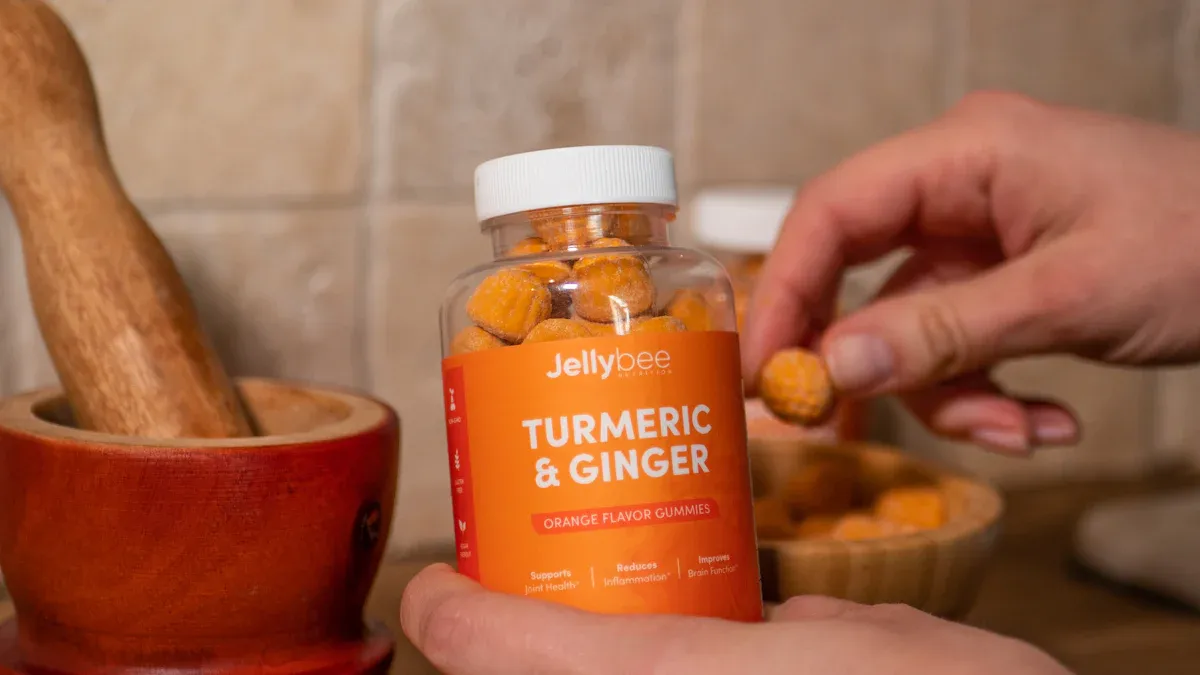
Mechanisms
When you compare creatine vs nootropics brain health, you see that both work through different mechanisms in your brain. Creatine supports your brain by increasing ATP production. This process gives your brain cells more energy, which helps you handle demanding tasks and maintain strong function. Creatine supplementation raises phosphocreatine stores, which means your brain can recover faster after stress and keep up with high performance.
Nootropics use several pathways to support your brain. Some nootropics boost neurotransmitters, which help your brain send signals quickly. Others improve blood flow, bringing more oxygen and nutrients to your brain. Certain nootropics reduce oxidative stress, protecting your brain from damage. Some even help your brain grow new connections, which supports learning and memory.
Mechanism | Creatine | Nootropics |
|---|---|---|
Energy Production | Increases ATP and phosphocreatine | Varies: Some support energy, some do not |
Neurotransmitter Support | Modulates dopamine, serotonin, and BDNF | Boosts acetylcholine, dopamine, serotonin |
Blood Flow | Indirect support | Direct improvement in some compounds |
Neuroprotection | Reduces cell loss, supports recovery | Reduces oxidative stress, supports growth |
Studies show that creatine supplementation helps your brain stay energized during tough cognitive tasks. You see the effects of creatine most clearly when you need quick thinking or strong memory. Studies also show that nootropics can help with neurotransmitter balance and blood flow, but the effects depend on the type of compound you use.
Benefits
You may wonder about the benefits of creatine vs nootropics brain health. Studies highlight that creatine supplementation improves memory, processing speed, and mental performance. You see the effects of creatine when you face tasks that require executive function. Studies show that creatine helps with both short term memory and long term memory. You may notice less mental fatigue and sharper recall.
Nootropics offer benefits for focus, attention, and memory. Studies show that some nootropics help with verbal learning and memory consolidation. You may see improvements in short term memory and long term memory, especially with compounds like Bacopa monnieri and Citicoline. However, studies also show that the effects of nootropics vary from person to person.
Benefit | Creatine | Nootropics |
|---|---|---|
Memory | Improves short term and long term memory | Supports memory, varies by compound |
Processing Speed | Faster reaction times, better performance | Some improve speed, others do not |
Mental Fatigue | Reduces fatigue during tough tasks | May help, but effects are inconsistent |
Focus and Attention | Supports executive function | Some compounds boost focus and attention |
Overall Performance | Consistent improvement in studies | Mixed results in studies |
Studies show that creatine supplementation gives you reliable benefits for cognitive function. You see the effects of creatine in many research studies, especially when you need strong performance in memory and executive function. Nootropics can help, but studies show that the benefits depend on the compound and your individual response.
Safety
Safety is important when you compare creatine vs nootropics brain health. Studies show that creatine supplementation is safe for most healthy people. You may notice mild effects like digestive discomfort, but serious side effects are rare. Studies report that creatine does not cause dependency or withdrawal. You see creatine used safely in many research studies for both muscle and brain function.
Nootropics carry more risks. Studies show that nootropics can cause cognitive and physical side effects, such as:
Withdrawal
Addiction or dependency
Allergic reactions
Insomnia
Blurry vision
High blood pressure
Fast heart rate
Cardiovascular problems
Mood changes like anxiety and irritability
Personality changes
A 2022 review found that nootropics might reduce learning ability or even contribute to cognitive decline. Non-natural nootropics carry extra risks because of high doses and lack of regulation. Studies show that you should use caution with these supplements, especially if you have health concerns.
Safety Profile | Creatine | Nootropics |
|---|---|---|
Common Side Effects | Mild digestive discomfort | Wide range: insomnia, mood changes, etc. |
Dependency Risk | None reported in studies | Possible with some compounds |
Regulation | Well-studied, regulated | Many are unregulated, especially synthetic |
Long-Term Effects | Safe in studies, ongoing research | Some risk of cognitive decline |
Medical Disclaimer: This information is for educational purposes only. You should not consider it medical advice. Always consult a healthcare professional before making health-related decisions or starting new supplements.
Who Should Use
Choosing between creatine and nootropics depends on your age, health goals, and daily demands. You may find that one option fits your needs better than the other.
Creatine: Who Benefits Most?
You might consider creatine if you want to support your brain as you age or face cognitive challenges. Research shows that older adults and people with Alzheimer’s disease can benefit from creatine supplementation. Creatine helps maintain brain energy and may improve memory and thinking skills.
Population | Findings |
|---|---|
Elderly | Creatine is effective and safe, potentially improving cognitive outcomes. |
Alzheimer’s Patients | Creatine supplementation may offer cognitive benefits and is feasible for use. |
Alzheimer’s Patients |
If you are an older adult, creatine may help you stay mentally sharp. You may also consider creatine if you want extra support for your brain during stressful periods or demanding tasks.
Nootropics: Who Benefits Most?
Younger adults often look for ways to boost memory, focus, and mental energy. Studies show that nootropics can help people ages 18–30 improve cognitive abilities. If you are a student, athlete, or work in a high-demand job, you may notice better attention and faster thinking with nootropic supplements.
You may benefit from nootropics if you:
Want to improve memory, focus, or alertness
Are a young healthy adult seeking cognitive enhancement
Face high mental demands in school, sports, or work
Need extra support for executive function and attention
Researchers also note that older adults, athletes, and military personnel may experience cognitive improvements from nootropics. If you want to maintain mental performance or recover from fatigue, nootropics may offer helpful support.
Tip: Your choice depends on your age, health status, and cognitive goals. Creatine works best for older adults and those with cognitive decline. Nootropics suit younger adults and people who want sharper focus and memory.
Supplement | Best For | Key Benefits |
|---|---|---|
Creatine | Elderly, Alzheimer’s patients | Memory, processing speed, safety |
Nootropics | Young adults, high-demand jobs | Focus, attention, executive function |
Medical Disclaimer: This information is for educational purposes only. You should not consider it medical advice. Always consult a healthcare professional before making health-related decisions or starting new supplements.
Combination Use
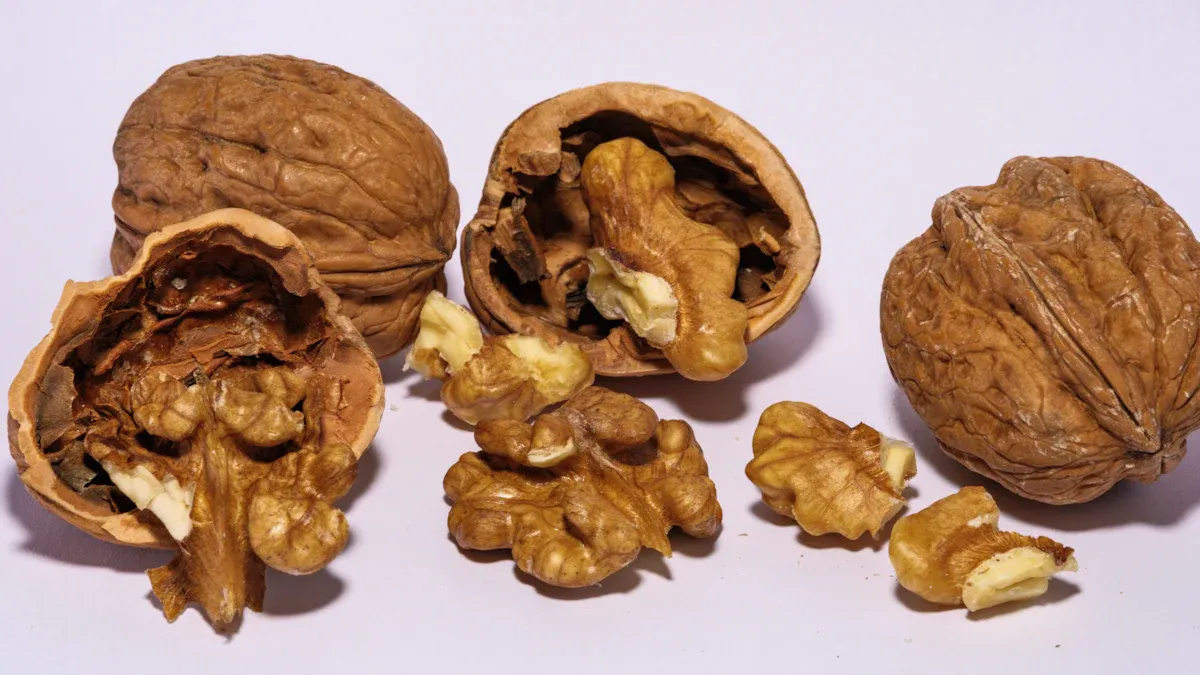
Can You Combine?
You may wonder if you can use creatine and nootropics together for better brain health. Many people choose to combine these supplements to support different aspects of brain function. Creatine helps your brain produce more energy, which can improve memory and processing speed. Nootropics often target neurotransmitters or blood flow, giving your brain extra support for focus and attention.
Researchers have not found major risks when you use creatine and nootropics at the same time. Most healthy adults tolerate this combination well. You should always watch for side effects, especially when you start new supplements. Some people notice mild digestive discomfort or headaches. If you feel unwell, stop using the supplements and talk to a healthcare professional.
Tip: Combining creatine and nootropics may help you tackle tough mental tasks, like exams or long workdays. You can support your brain’s energy and boost your focus at the same time.
Here is a quick look at how these supplements work together:
Supplement | Main Benefit | How It Supports Brain Health |
|---|---|---|
Creatine | Energy production | Increases ATP for brain cells |
Nootropics | Neurotransmitter support | Improves focus and attention |
Dosage Tips
You need to follow safe dosage guidelines when you combine supplements for brain health. Most experts recommend a daily dose of 5 grams of creatine for cognitive benefits. If you want faster results, you can use a loading phase with 20 grams per day for one week, then switch to 5 grams daily for maintenance.
Here are some tips for safe use:
Start with the lowest recommended dose for each supplement.
Take creatine with water to help your body absorb it.
Use only one new nootropic at a time to see how your brain responds.
Monitor your mood, focus, and energy levels each day.
Avoid mixing too many supplements at once.
Note: Always read supplement labels and check for interactions. Your brain health depends on safe and informed choices.
If you want to combine creatine and nootropics, keep your routine simple. You can take creatine in the morning with breakfast. Choose a nootropic that fits your needs, such as Bacopa monnieri for memory or Citicoline for focus. Track your progress and adjust your routine if needed.
Medical Disclaimer: This information is for educational purposes only. You should not consider it medical advice. Always consult a healthcare professional before making health-related decisions or starting new supplements.
Comparison Table
Quick Reference
You may want a quick way to compare creatine and nootropics for brain health. The table below gives you a side-by-side look at the most important features. This can help you decide which option fits your needs best.
Feature | Creatine | Nootropics |
|---|---|---|
Main Action | Boosts brain energy (ATP) | Varies: neurotransmitters, blood flow |
Cognitive Benefits | Memory, processing speed, mental energy | Focus, attention, memory (varies) |
Best For | Older adults, cognitive decline, athletes | Young adults, students, high-demand jobs |
Forms | Powder, capsule, liquid | Herbs, nutrients, synthetic compounds |
Onset of Effects | Days to weeks | Hours to weeks (depends on type) |
Safety | Well-studied, mild side effects | Varies; some risk of side effects |
Dependency Risk | None reported | Possible with some synthetic types |
Regulation | Regulated, well-researched | Some unregulated, especially synthetics |
Combination Use | Safe with many nootropics | Often combined with other supplements |
Tip: Use this table as a quick guide when you compare supplements. You can see at a glance which option matches your goals.
Key Points to Remember:
Creatine works best if you want steady support for memory and mental energy.
Nootropics may help if you need a fast boost in focus or attention.
Your age, health, and daily demands can change which supplement works better for you.
You can combine creatine and nootropics, but always start with low doses and watch for side effects.
How to Use This Table:
Identify your main goal (memory, focus, energy).
Check which supplement matches your needs.
Review the safety and onset of effects.
Decide if you want to try one or both.
Medical Disclaimer:
This information is for educational purposes only. You should not consider it medical advice. Always consult a healthcare professional before making health-related decisions or starting new supplements.
Current research shows creatine supports your brain by boosting energy and protecting cells, especially during demanding tasks. You may notice improvements in memory and mental performance. Nootropics can help with focus, memory, and sharpness, but effects vary.
Creatine works best for older adults or those needing brain energy.
Nootropics suit younger users seeking memory and focus.
Always consult a healthcare professional before starting supplements. Informed choices help you protect your brain and maintain healthy memory.
Medical Disclaimer: This information is for educational purposes only. You should not consider it medical advice. Always consult a healthcare professional before making health-related decisions or starting new supplements.
FAQ
Can creatine improve your brain function if you do not exercise?
Yes, creatine can support your brain even if you do not exercise. Studies show that creatine helps with memory and mental energy during challenging tasks. You may notice benefits in focus and processing speed.
Are nootropics safe for your brain health?
Most nootropics are safe for healthy adults when used as directed. You should watch for side effects like headaches or mood changes. Always check with a healthcare professional before starting new supplements for your brain.
How long does it take to see brain benefits from creatine?
You may start to notice improvements in brain function after several days to a few weeks of regular creatine use. Effects depend on your age, diet, and daily mental demands.
Can you use creatine and nootropics together for better brain results?
You can combine creatine and nootropics to support different aspects of brain health. Creatine boosts energy, while nootropics may help with focus or memory. Start with low doses and monitor your brain’s response.
Which supplement works best for memory and brain energy?
Creatine works well for boosting brain energy and supporting memory, especially in older adults. Nootropics may help with focus and attention. Your choice depends on your age and your brain health goals.
Do you need a prescription for nootropics that affect the brain?
Some synthetic nootropics require a prescription because they have strong effects on the brain. Natural options like Bacopa monnieri or Ginkgo biloba are available over the counter. Always research products before use.
What side effects should you watch for when using brain supplements?
You may experience mild side effects such as headaches, digestive discomfort, or mood changes. If you notice unusual symptoms, stop using the supplement and talk to a healthcare professional about your brain health.
Medical Disclaimer:
This information is for educational purposes only. You should not consider it medical advice. Always consult a healthcare professional before making health-related decisions or starting new supplements.
